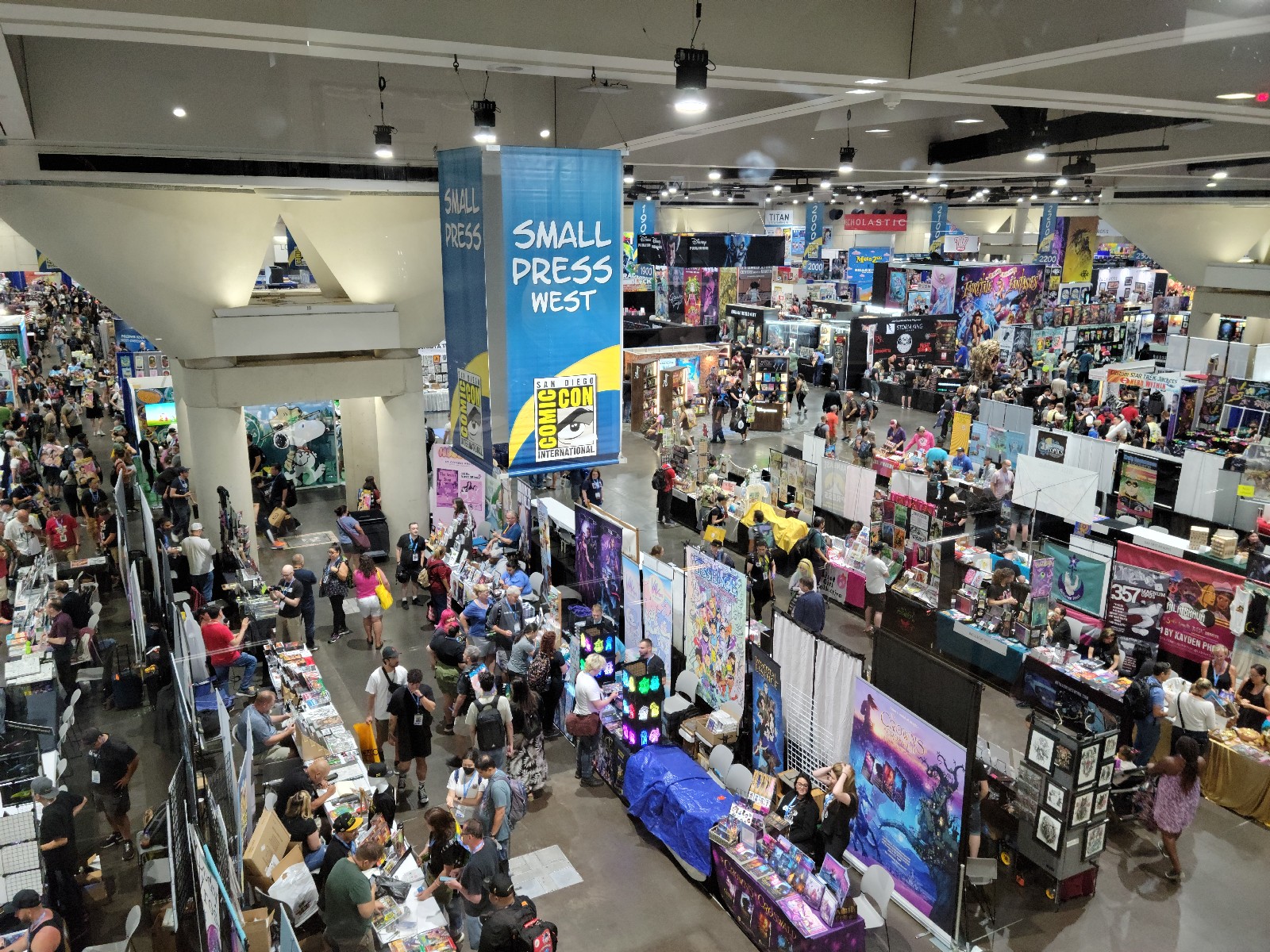Josh picks up where he and Violet parted ways on Thursday, July 21 after Comic-Con HQ, when Violet went to get in line for Marvel’s Luke Cage panel at San Diego Comic-Con 2016.
So, Violet and I parted ways at about 4:00pm, so that I could go see the Overwatch panel, and to be sure I would make it in to the panel, I headed over to Room 6A pretty early. It was a good idea too, as there was a line waiting to get into the room, and the Overwatch Panel, which started at 6:45pm, wasn’t even the next panel up!
One of the great things about Comic-Con is the people that attend it. I am not much of a people person myself, and I tend to not have much to say at times, but often people at Comic-Con make that easier for me, and while in line I met a very nice lady, (who I was rude enough to not ask the name of or look at her badge) that is going to USC Grad School for the film industry and is interning at Columbia Pictures. While waiting in line we had an interesting conversation about movies, TV, and what makes a good movie, and other interesting stuff. It was a nice highlight showing that Comic-Con is more than just the Convention floor, the panels you attend, the exclusives you’re dying to get, but also about how sometimes, you can meet some really nice people who have similar interests to you.
Finally the line was let into Room 6A, and the panel that was coming up next was Nerdist TV: The Boundary Pushers. This panel was moderated by Alicia Lutes, Nerdist’s Managing Editor, and had three showrunners on the panel–Bryan Fuller, showrunner for Hannibal and the new Star Trek, Michael Green, who was in charge of Smallville, (both Michael Green and Bryan Fuller are also showrunners for the upcoming American Gods TV show based on the novel of the same name), and Steven Moffat, showrunner and writer for Doctor Who and Sherlock.
The panel begins with Alicia asking the panelists about genre TV, and asks what they think about genre TV and how it has bettered television overall. Steven Moffat jumps in first, saying that he doesn’t see a big difference between genre TV and other TV, and says that ideas are at the “heart of it”. He also describes genre TV as a “huge idea”.
Bryan Fuller also chimes in saying that reality is not as big of a concern for their genre television, as it allows more choices for the writers. Michael Green also chimes in saying that no one really wanted it until the past several years.
Bryan Fuller also talks about the idea of escapism that genre television can provide. While talking about that though, he pokes fun at the craziness he sees at the Republican National Convention. He doesn’t seem anti-Republican, however, as he mentions that certain Republicans are bringing the good ones down. It sounds like Trump might have been the target of his barbs.
Stephen Moffat, meanwhile, argues that he doesn’t think there was a time when genre television wasn’t desired. He talks about times at the BBC where when people tried to pitch genre TV, and would try to back it up with talking about the success of Star Trek and Star Wars, and the BBC would call those “exceptions.” However, Moffat seems to think genre TV was something most people did still want.
Fuller then talks about how writers are consumers too, so they can watch something they like, and keep that in mind when they are working on their shows.
Alicia Lutes then asks the panelists how it is working on shows with such a big fandom. Moffat makes the argument that the people making shows are the same people watching shows, saying that writers are just ordinary people. He segues into talking about how ordinary people can make shows on their iPhones, or other very affordable devices now.
Also talked about is how characters work or do not work, and Moffat says that it’s unpredictable. Fuller chimes in and discusses how characters should feel authentic, by having a portion of the writer in the character. The panelists also talk about writing for characters that previously existed, and Fuller refers to it as “fan fiction”. Moffat chimes in saying that he thinks it is important that he knows he is not trying to change the original character, but merely put his own take on it.
Alicia Lutes then asks about how it is pushing the envelope in terms of trying to make things happen on their shows. Fuller discussed how he wanted to make the main character on Pushing Daisies “pass formaldehyde” since she was dead. The Network didn’t think that would go over well, so Fuller made the character Jewish (they don’t embalm the dead). Moffat talks about how sometimes he wished the character would say no, but they wouldn’t. Moffat talks about the Doctor Who episode Heaven Sent being a tough episode though, as it only had the Doctor in it. He also talks about doing the table read for that with Peter Capaldi, as it was just “Two Scots” barking at each other.
Overall though, the three seemed to agree that they were able to do what they wanted for the most part. One exception Fuller had though, was not being able to show a bare buttocks on TV, which he thought boiled down to an American sentiment that we as a country find violence less gruesome than sexuality. Bryan Fuller talks about how he could not show Hannibal’s backside but could show a whole lot of blood and gore. Bryan Fuller also takes some time to talk about his disdain for the Vice Presidential candidate, who is anti-gay. Fuller seems to have not very fond thoughts for these Republican candidates.
Steven Moffat also discusses how the audience tends to be smarter than the showrunners, meaning that they will often come up with either better ideas than what was written for the show, or figure out where the show is going, despite him thinking he really has the audience fooled. He emphasizes that the audience should not be underestimated. He discusses how story-telling can go wrong if the writers are not giving a clear story, and earning the attention of the audience. He goes so far as to say that the audience loves exposition, given it is done well when making the story. He says interest in a story is more important than worrying about the complicatedness of a story.
Alicia then asks the panelists if their shows help with social change, and normalize social issues, and Bryan Fuller talks about the show Will and Grace, talking about how that show helped to somewhat normalize homosexuality, but making that part of Will’s character as almost a secondary thing to the show. Steven Moffat jumps in agreeing with this sentiment, saying that making the homosexuality the most boring aspect of the show really does help convince children and other people that there is nothing wrong with being gay, and that children shouldn’t have to feel apologetic about being gay.
Another question ALicia Lutes has for the panelists is if there has ever been an idea they have seen in a piece of fan theory about their shows that they wanted to use in their shows. Moffat says he has just once on an episode of Sherlock, but he said while he likes reading fan theories, he wants to make the stories his own. Michael Green chimes in saying that typically his shows were filmed so far in advance, that there wasn’t really an opportunity for that anyway.
Interestingly, when asked what their dream show/job would be, they generally answered they have achieved that with their respective jobs they currently have or already had. One thing Moffat mentions he would like to do is an episode of Columbo, but as we all know, that actor has passed.
The panel then is opened up to audience questions. The panel is asked what they think about fan-fiction, and the panelists all seem to enjoy reading it. Fuller remarks how dark some of the Hannibal fan-fiction went, but is happy to see people take the character stories the way they want. Moffat, meanwhile, talks about how his work is basically fan-fiction, given there is an original story.
Then the panel is asked about how people like himself can meet up with showrunners to talk to them about ideas, and Moffat has a pretty poignant answer: it is not who you know, but what you do, explaining that there is so much technology nowadays, that content is easier to create than ever. He also remarks that people who talk to him end up liking him less, which was a funny point.
Then the panel is asked about continuity in the show, and Moffat is quite honest that he just doesn’t bother. He rephrases that to a point, saying that certain continuities cannot be broken, but for the sake of a good story/episode, some minor continuities can be broken. He makes a good argument for this in his own show, referencing humans always being surprised when they see a Dalek invasion, with people not knowing what the aliens are, and with James Bond, who seems to never get a promotion or any perks for saving the world several times over.
Overall, I really enjoyed this panel. There were a lot of interesting things that made me think about the way TV is made in a different way. Steven Moffat certainly has some specific ways in which he thinks about storytelling with his shows. One other interesting tidbit that came out regarding the show Hannibal. Bryan Fuller revealed that the show’s rights are currently tied up with CBS currently, and in August 2017 the rights will be released, so he can shop the show around at that point.
Up next, I waited for the Overwatch panel to start, which was in the same room. Click here to continue to that article!













